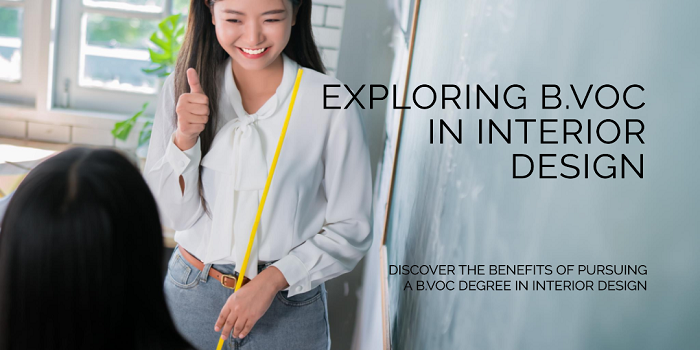Are you passionate about interior design? Do you aspire to pursue a career in this creative field? If so, you may have come across the term “B.Voc in Interior Design.” In this article, we will delve into the details of what B.Voc in Interior Design is all about and how it can shape your career in the world of aesthetics and functionality.
Table of Contents
- Introduction to B.Voc
- Exploring Interior Design
- B.Voc in Interior Design: An Overview
- Curriculum and Course Structure
- Skill Development
- Industry Exposure and Internships
- Career Opportunities
- Advantages of Pursuing B.Voc in Interior Design
- B.Voc vs. Traditional Degree Programs
- Challenges and Opportunities
- Conclusion
1. Introduction to B.Voc
B.Voc stands for Bachelor of Vocation, which is an undergraduate degree program focused on developing vocational skills in specific industries. Unlike traditional degree programs, B.Voc emphasizes practical training and industry-relevant knowledge. It aims to bridge the gap between academia and the job market, preparing students for immediate employment.
2. Exploring Interior Design
Interior design is a multidisciplinary field that combines creativity, aesthetics, and functionality to enhance the interior spaces of various structures. It involves the art and science of creating harmonious environments that cater to the needs and preferences of individuals or organizations.
3. B.Voc in Interior Design: An Overview
B.Voc in Interior Design is a specialized program designed to equip students with the necessary skills and knowledge to excel in the field of interior design. It offers comprehensive training in various aspects of interior design, including space planning, color theory, furniture design, lighting, materials, and project management.
4. Curriculum and Course Structure
The curriculum of B.Voc in Interior Design typically covers a wide range of subjects to provide a holistic understanding of the field. Students learn about design principles, architectural drafting, 3D visualization, sustainable design practices, building codes and regulations, and software applications used in the industry. The course structure incorporates theoretical learning, practical assignments, workshops, and industry visits.
5. Skill Development
One of the key focuses of B.Voc in Interior Design is skill development. Students undergo rigorous training to enhance their creative thinking, problem-solving abilities, communication skills, and project management capabilities. They learn to work with various design tools and software, gaining proficiency in creating digital representations of their design concepts.
6. Industry Exposure and Internships
B.Voc programs often emphasize industry exposure and internships to provide students with real-world experience. Through internships, students get the opportunity to work alongside experienced professionals, understand the dynamics of the industry, and apply their theoretical knowledge to practical projects. This exposure helps them build a strong portfolio and establish valuable connections within the industry.
7. Career Opportunities
A B.Voc in Interior Design opens up a plethora of career opportunities. Graduates can work as interior designers, design consultants, space planners, furniture designers, project managers, or visual merchandisers. They can find employment in architectural firms, interior design studios, real estate companies, hospitality organizations, and retail establishments. Additionally, some graduates may choose to start their own design firms or freelance as independent interior designers.
8. Advantages of Pursuing B.Voc in Interior Design
Pursuing B.Voc in Interior Design offers several advantages. Firstly, it provides practical and industry-oriented training, making graduates more job-ready compared to traditional degree programs. Secondly, it focuses on skill development, equipping students with the necessary expertise to excel in the field. Thirdly, internships and industry exposure help students build a strong professional network and gain valuable insights into the industry.
9. B.Voc vs. Traditional Degree Programs
While traditional degree programs provide a broader academic foundation, B.Voc programs offer specialized and skill-oriented training. B.Voc programs are designed to cater to the needs of the industry, ensuring graduates possess the practical skills required in the job market. However, individuals with a strong inclination towards research or academic pursuits may still prefer traditional degree programs.
10. Challenges and Opportunities
While pursuing a career in interior design can be rewarding, it also comes with its own set of challenges. The industry is highly competitive, and professionals need to constantly demonstrate their creativity and adaptability. Additionally, meeting client expectations, managing budgets and timelines, and keeping up with evolving design trends can be demanding. However, these challenges also bring opportunities for growth and innovation within the field.
Conclusion
B.Voc in Interior Design offers a practical and specialized pathway for individuals passionate about interior design. The program equips students with the necessary skills, knowledge, and industry exposure to thrive in this creative and dynamic field. With a growing demand for skilled interior designers, pursuing B.Voc in Interior Design can pave the way for a successful and fulfilling career.
FAQs (Frequently Asked Questions)
1. What is the duration of the B.Voc in Interior Design program?
The duration of the program may vary depending on the institution. Generally, B.Voc in Interior Design is a three-year undergraduate program.
2. Is B.Voc in Interior Design a recognized degree?
Yes, B.Voc in Interior Design is a recognized undergraduate degree program offered by accredited institutions.
3. Can I pursue higher education after completing B.Voc in Interior Design?
Yes, after completing B.Voc in Interior Design, you can opt for higher education programs such as a master’s degree in interior design or related fields.
4. What are the essential skills needed for a successful career in interior design?
Some essential skills for a successful career in interior design include creativity, attention

